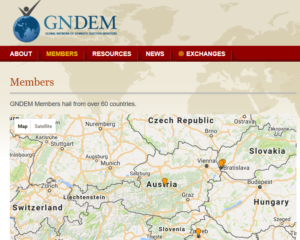Wahlbeobachtung.org tritt globalem Wahlbeobachternetzwerk GNDEM bei

Wahlbeobachtung.org ist mit Januar 2017 dem globalen Netzwerk für nationale Wahlbeobachter (GNDEM) beigetreten und ist nun auch offiziell ein Unterstützungsmitglied der Declaration of Global Principles for Nonpartisan Election Observation and Monitoring by Citizen Organizations und des Code of Conduct for Nonpartisan Citizen Election Observers and Monitors. GNDEM vereint über 235 verschiedene Wahlbeobachterorganisationen in 86 verschiedenen Ländern. Wahlbeobachtung.org sieht dies als weiteren Schritt zu einer notwendigen Gesetzesnovellierung, um auch in Österreich nationale Wahlbeobachtung anzuerkennen und nationale Wahlbeobachter zu akkreditieren.
The Global Network of Domestic Election Monitors (GNDEM) is based on the following precepts: The authority of government derives from the will of the people expressed in genuinely democratic elections. Everyone has the right to participate in government and public affairs, including by seeking to be elected and to vote in genuinely democratic elections. Elections therefore belong to the people, and citizens have a right to know whether elections honestly and accurately reflect the people’s will.
Nonpartisan (politically impartial and independent) election monitoring by citizens is an extension of the rights to genuine elections, to participate in public affairs, to associate and to seek, receive and impart information in the electoral context. It is both an exercise of fundamental rights and a form of human rights defending, because nonpartisan election monitoring by citizens seeks to safeguard electoral integrity, including the rights to participate in electoral and political processes. That is inseparable from defending the ability of citizens to exercise a broad array of civil and political rights and is affected by the actions of a range of governmental authorities, as well as political contestants.
GNDEM and all of its members recognize that with rights come responsibilities, and nonpartisan election monitoring by citizens encompasses ethical obligations to fellow citizens – including prospective voters, electoral contestants, electoral administrators and others concerned with organizing genuinely democratic elections. Among these ethical obligations is upholding the highest standards of impartiality and accuracy. This includes employing credible methodologies that incorporate the best practices that are suited to national conditions and to operate in a cooperative manner with other electoral stakeholders, including election authorities, while not hindering or obstructing electoral processes or attempting to influence voters’ choices at the ballot box. The Declaration of Global Principles for Nonpartisan Election Observation and Monitoring by Citizen Organizations and Code of Conduct for Nonpartisan Citizen Election Observers and Monitors embodies GNDEM’s approach to rights, responsibilities and ethical obligations of nonpartisan citizen election monitoring, and GNDEM encourages its members to endorse and implement the Declaration and Code of Conduct.
The more than 235 GNDEM members, including regional networks and individual nonpartisan election monitoring organizations spanning over 86 countries on five continents, form this global network in order to better meet challenges for achieving genuinely democratic elections and to further our common aspirations for representative, responsive, transparent, democratic governance. GNDEM seeks to advance the methodologies for systematic, fact-based election monitoring and to advance the capacities of regional networks and nonpartisan election monitoring organizations through sharing of knowledge and interactive communications among members. GNDEM’s approach reinforces the role of regional networks where they exist and helps them develop elsewhere, while it encourages individual member organizations to engage with others and to draw upon the global wealth of experiences and best practices. GNDEM accomplishes this through its electronic Resource Center, which presents over 1,000 best practice documents from around the world arranged by topics that were prioritized by members, and through facilitating interactions among members by using information communication technologies (ICTs) and cross-regional working sessions.
 Prof. Manfred Nowak am Election-Watch.EU Advisory Board
Prof. Manfred Nowak am Election-Watch.EU Advisory Board
 Wahlregistrierungsfristen für die Europawahl
Wahlregistrierungsfristen für die Europawahl
 Künstliche Intelligenz – Fluch oder Segen? Panel Diskussion am Europäischen Mediengipfel
Künstliche Intelligenz – Fluch oder Segen? Panel Diskussion am Europäischen Mediengipfel
 ERSTER UPDATE DES DEMOKRATIE-INDEX
ERSTER UPDATE DES DEMOKRATIE-INDEX